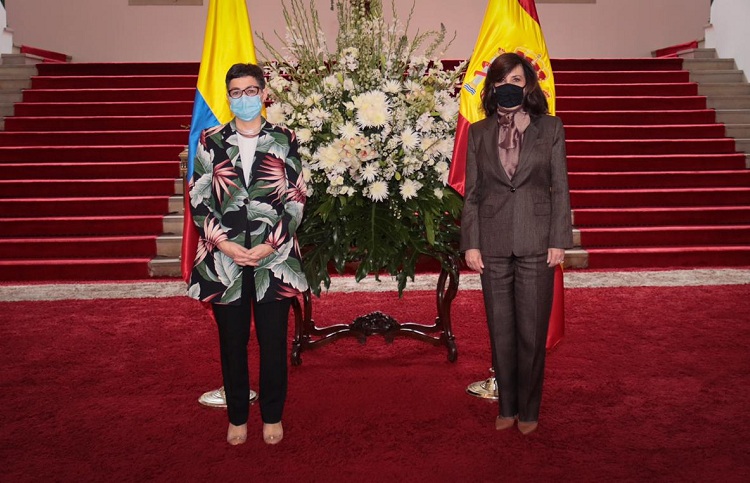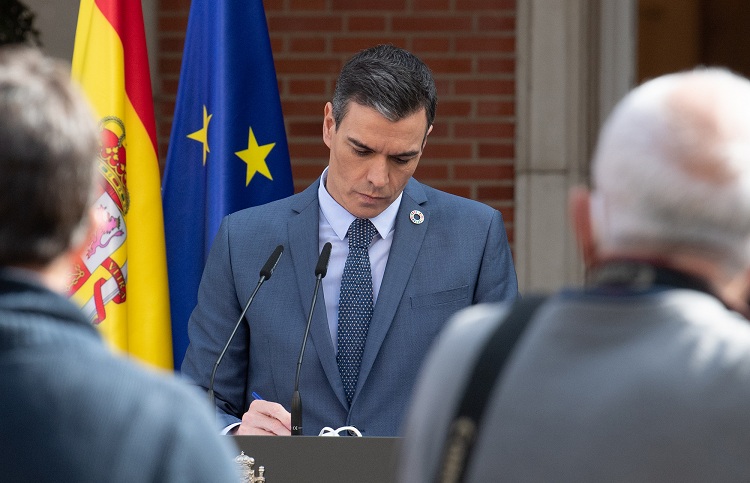The Diplomat
The Minister of Foreign Affairs, Arancha González Laya, yesterday completed an intense day of work during her three-day official visit to Colombia, which included the signing of the Country Partnership Framework for development cooperation and an important meeting with the presidents of the institutions of the Comprehensive System of Truth, Justice, Reparation and Non-Repetition.
The visit began on Thursday evening with a meeting with the President of the Republic of Colombia, Iván Duque, at the Casa de Nariño, the seat of the Presidency, and continued early on Friday with a meeting with representatives of Spanish companies based in Colombia at the residence of the Spanish Embassy in Bogotá, attended by the ambassador, Marcos Gómez, and the economic and commercial counsellor of the Embassy, Alicia Montalvo. The number of Spanish businessmen in the South American country is currently estimated at 600.
González Laya then held a meeting with the presidents of the institutions of the Integral System of Truth, Justice, Reparation and Non-Repetition, set up after the peace agreements (signed in November 2016 with the FARC) to work towards reconciliation and reparation for victims. Specifically, the minister met with the president of the Special Jurisdiction for Peace (JEP), Eduardo Cifuentes; the president of the Truth Commission, Jesuit priest Francisco de Roux; and the director of the Unit for the Search for Missing Persons (UBPD), Luz Marina Monzón.
After this meeting, the minister told the media that “the peace accords put an end to the war, but that is when the task of reconciliation and justice begins”. This is why the work of these institutions is “so important”, because only by “shedding light on the past can the future of Colombians be built on solid foundations”. “Spain, a country that has also known the conflict, firmly and decisively supports the work of these institutions, knowing as we do that their task is not finished, that their work will last because the wounds caused by this conflict are deep”, she added.
González Laya was later received by the Minister of Foreign Affairs of the Republic of Colombia, Claudia Blum, at the Palace of San Carlos, with whom she discussed the Temporary Protection Statute programme for Venezuelan migrants, launched by the Duque government to welcome and guarantee the rights of Venezuelan families in the country. The two ministers also discussed issues related to cultural diplomacy, economic relations between the two countries, trade and investment exchange, economic recovery after the COVID-19 pandemic and the implementation of the policy of Peace with Legality, “which has had the constant support of Spain and which has had significant progress, acceleration and effective results”, according to the Colombian Foreign Ministry.
In addition, Blum and González Laya signed the Country Partnership Framework for development cooperation, which will define the priority lines of work of Spanish cooperation with Colombia until 2024. In addition, the Spanish delegation, which included the Director of AECID, Magdy Martínez-Solimán, met with representatives of international organisations and Spanish Non-Governmental Development Organisations (NGDOs) in Colombia.
Today, González Laya will travel to the border town of Cúcuta to observe the impact of the Venezuelan migration phenomenon on the ground. Colombia is the country that has received the largest number of migrants and refugees, and “has maintained a generous open-door policy, the latest milestone of which has been the granting of Temporary Protection Status to Venezuelans”, according to the Spanish Ministry of Foreign Affairs.






